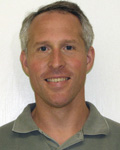A Lightning Introduction to Non-equilibrium Statistical Physics
Category
Published on
Abstract
A brief and birds eye introduction to non-equilibrium statistical physics. This tutorial is organized around the 1st and 2nd laws of thermodynamics. It begins with brief review how the 1st and 2nd laws apply to macroscopic systems in the context of old fashion 19th century thermodynamics with respect to the properties of bulk systems. It then continues on to 20th century statistical physics sought to make sense of the laws of thermodynamics by acknowledging that these bulk systems are made of up many-many atoms and molecules and how these laws arise from very many microscopic degrees of freedom. Finally a discussion on how the laws of thermodynamics apply to individual small systems. The tutorial ends with a breif discussion of Maxewell's Demon and the thermodynamic consequences of information processing.
Bio

Christopher Jarzynski received his A.B. (with high honors) in 1987 from Princeton University and his Ph.D. in 1994 from University of California, Berkeley. His research focuses on statistical mechanics and thermodynamics at the molecular level, with a particular focus on the foundations of nonequilibrium thermodynamics. His research group has worked on topics that include the application of statistical mechanics to problems of biophysical interest; the analysis of artificial molecular machines; the development of efficient numerical schemes for estimating thermodynamic properties of complex systemsl; the relationship between thermodynamics and information processing; quantum and classical shortcuts to adiabaticity; and quantum thermodynamics.
Sponsored by
Cite this work
Researchers should cite this work as follows:
Time
Location
Physics, Room 242, Purdue University, West Lafayette, IN